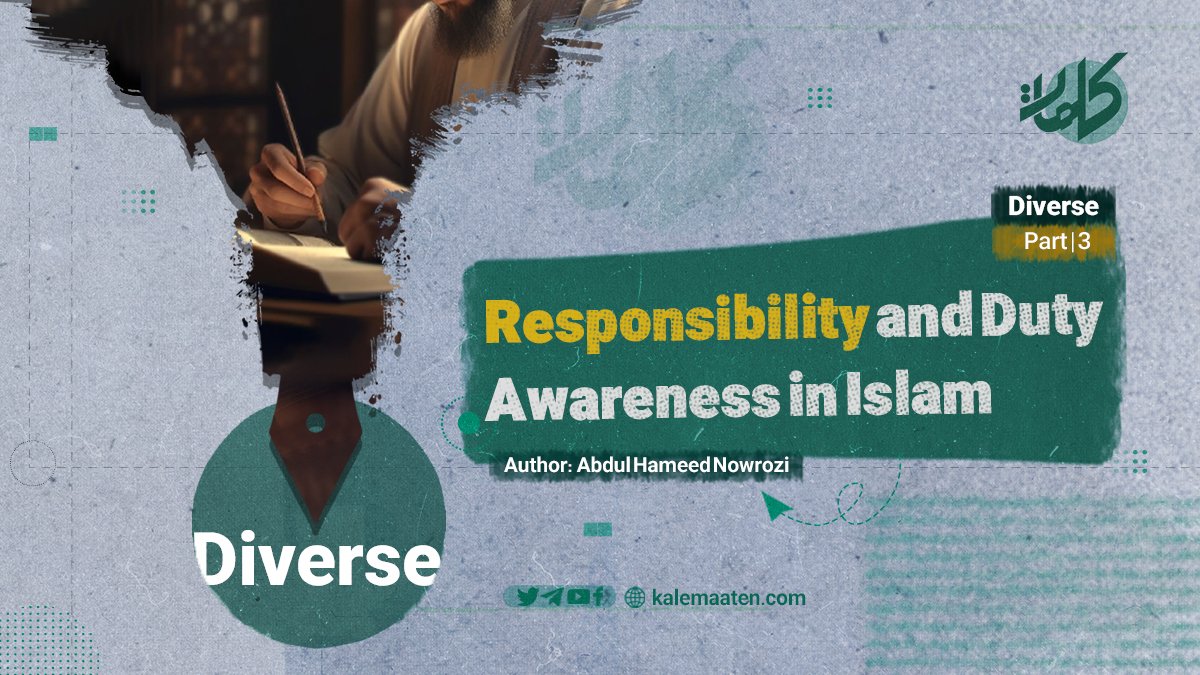
Author: Abdul Hameed Nowrozi
Responsibility and Duty Awareness in Islam (Part 3)
The Importance of Responsibility in Verses and Narrations
The legal system of Islam is duty oriented. For example, in religious texts, when discussing human rights, it refers to the rights that others have over us, or, in other words, the responsibilities we have toward others.
In the Holy Quran, there are many verses that emphasize the importance of responsibility and accountability for humans, as Allah Almighty states: «وَلا تَقْفُ مَا لَيْسَ لَكَ بِهِ عِلْمٌ إِنَّ السَّمْعَ وَ الْبَصَرَ وَ الْفُؤَادَ كُلُّ أُولَـٰئِكَ كَانَ عَنْهُ مَسْؤُولًا» Translation: “Do not follow that of which you have no knowledge; indeed, the hearing, the sight, and the heart—all of these will be held accountable.”
The concept of responsibility is of such importance that in many interpretations, the divine trust (Amanah) is referred to as the very commitment and acceptance of responsibility. «إِنَّا عَرَضْنَا الْأَمَانَةَ عَلَى السَّمَاوَاتِ وَ الْأَرْضِ وَ الْجِبَالِ فَأَبَيْنَ أَنْ يَحْمِلْنَهَا وَ أَشْفَقْنَ مِنْهَا وَ حَمَلَهَا الْإِنْسَانُ إِنَّهُ كَانَ ظَلُومًا جَهُولًا» Translation: “We offered the trust to the heavens, the earth, and the mountains, but they refused to bear it and were afraid of it; however, man undertook to bear it. Indeed, he was unjust and ignorant.”
The Holy Prophet, may Allah bless him and grant him peace, says: «كُلُّكُمْ رَاعٍ وَكُلُّكُمْ مَسْئُولٌ عَنْ رَعِيَّتِهِ» Translation: “All of you are responsible, and each official will be held accountable for the people under his supervision.”
The Necessity of Responsibility and Duty Awareness
According to what has been said, a question arises: what is the necessity of being accountable to a higher authority? What would happen if a person did not accept responsibility?
The creation of man and the world had a purpose, and the purpose of man’s creation is to worship and serve Allah; as Allah Almighty states: «وَمَا خَلَقْتُ الْجِنَّ وَ الْإِنْسَ إِلَّا لِيَعْبُدُونَ» Translation: “I did not create jinn and humans except to worship Me.”
The Almighty Allah has communicated the way to attain closeness to Him and the means of worship and service through His Messenger. After the Prophet, may Allah bless him and grant him peace, his guardians are responsible for teaching religious knowledge. In the meantime, we Muslims, who have accepted this invitation, find duties and responsibilities that bring us closer to human perfection.
Therefore, if we do not feel responsible in light of these precious blessings that Allah (SWT) has given to guide mankind, we will lead an empty and aimless life, and we will never reach the high position of humanity. This is where the necessity of being responsible before Allah Almighty becomes evident.
Responsibility to the Family
In Islamic culture, the family is the sacred center. In this religion, all family members, especially spouses, have responsibilities towards each other. Although the responsibilities of each family member are numerous, the responsibilities of men are greater than those of other family members. This is because the management of the family lies with the man, and he has the duty to foster kindness within the family through his actions and behavior, providing a peaceful environment by serving his family and being kind to its members.
A man’s kindness within the family will enable him to assume the responsibility of leading the family well. The Holy Quran addresses all believers: «يَا أَيُّهَا الَّذِينَ آمَنُوا قُوا أَنفُسَكُمْ وَ أَهْلِيكُمْ نَارًا وَقُودُهَا النَّاسُ وَ الْحِجَارَة» Translation: “O you who have believed, protect yourselves and your families from the fire whose fuel is men and stones.”
In this honorable verse, the term “قُوا” (protect) implies that if you leave people unaided, they will unintentionally drift toward the hellfire. It is your duty to rescue them from falling into it.
Although Islam emphasizes enjoining what is good and forbidding what is evil, it is evident from the above verse that a man bears greater responsibility toward his wife and children. He is obligated to strive significantly in their education and upbringing, guiding them away from sin and towards good deeds, rather than merely providing for their physical needs.
Continues…


